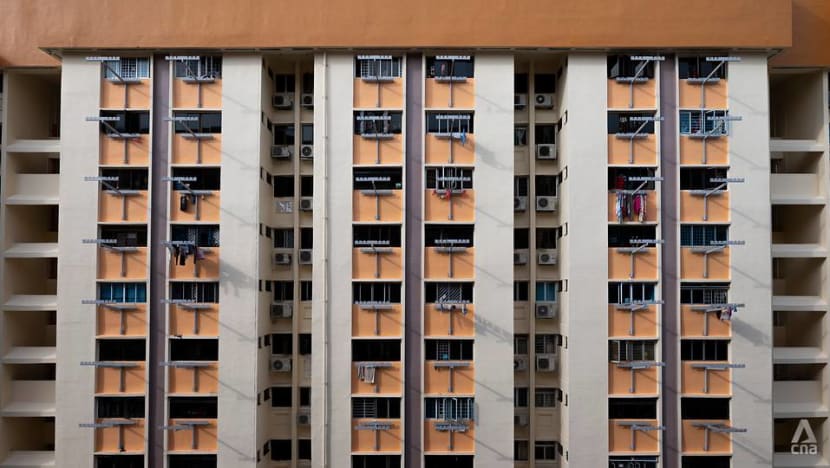Some elderly, vulnerable COVID-19 patients on home recovery will get visits by medical teams

File photo of a block of HDB flats in Singapore. (Photo: Calvin Oh)
SINGAPORE: Vulnerable COVID-19 patients recovering at home will soon get visits by mobile medical teams.
These patients include the elderly, people with multiple comorbidities and those who have chosen to recover at home instead of going to a care facility, said Mr Dinesh Vasu Dash, group director of the Crisis Strategy and Operations Group at the Ministry of Health (MOH).
“It's almost like the home vaccination team, so it's a home medical team that will be deployed to deal with people who are of the vulnerable setting,” he said on Wednesday (Oct 27).
"A team leaning forward might be more helpful to assess on the spot rather than through the phone to see if they're all okay. Then at least we are assured that they can recover safely at home."
Home recovery has been the default mode of care since Sep 15 for COVID-19 patients with mild or no symptoms. On average, around 70 per cent of those infected daily are recovering at home.
A few groups of patients are excluded from home recovery, such as unvaccinated or partially vaccinated people aged 50 and above, vaccinated people aged 80 and above, as well as children below one year old.
Elaborating on the need for such mobile teams, Singapore Armed Forces (SAF) Colonel Tong Yi Chuen, commander of the home recovery task group, said that they once encountered a family that was not able to teleconsult a doctor.
A team then visited the home to facilitate the process.
“We also got the doctor to … call the household to follow up with the consultations. So I think this is why we think in some cases, these mobile teams will be extremely useful,” he said.
Currently, people who are recovering at home and do not feel well have access to telemedicine operators. Among those who put in a request for telemedicine, 84 per cent of them got a call back within two hours, said Mr Vasu.
HOME RECOVERY
The home recovery programme had faced teething issues in the first few weeks of its launch, with residents complaining about the lack of clear instructions from authorities.
Giving an update on the programme on Wednesday, the task group said more than 90 per cent of COVID-19 patients who are eligible to recover at home are contacted for “onboarding” within 24 hours after submitting their details via a form.
Home recovery buddies, who include full-time SAF national servicemen and regulars, contact positive cases by phone to confirm their eligibility and formally include them in the programme, said the task group.
It added that more than 450 SAF personnel have been deployed to support the home recovery programme, up from the initial number of about 200.
“It is important for individuals to complete the COVID-positive Patient Details Form promptly so as to initiate a triaging process to assess their suitability for home recovery programme,” the task group said.
Some delays may occur due to administrative issues such as patients not filling up their mobile numbers correctly, said MOH’s Mr Vasu.
“Often, people fall through the cracks because they put it wrong telephone numbers and so forth, the team has been working extremely hard to find multiple ways to get to the individual,” he added.
If all else fails, ground engagement agents such as police officers or auxiliary police officers are activated to go knocking on doors, Mr Vasu said. This operation, however, cannot be expanded, he added.
“Therefore we need to have a high accuracy of the information that's provided to us,” he said.
Issues also arise when patients say they cannot self-isolate when they in fact can or change their minds about going to a care facility.
“Those kinds of things does add to the administrative burden does add to inefficiencies,” he explained.
ROLE OF HOME RECOVERY BUDDIES, CARE MANAGERS
Throughout the home recovery journey, individuals can contact a hotline to reach a home recovery buddy should they have any queries, the task group said.
Callers are given a menu of options, and their queries will then be routed to the correct parties so that their concerns can be addressed "more responsively and appropriately”, the task group said.
On top of home recovery buddies, a group of public service officers has also been designated as care managers. They follow up on those who are assessed to require additional support, such as older seniors, the task group added.
Care manager Mohamed Firdaus Mohamed Akbar, who was roped in to help about two weeks ago, said that one of the challenges he has faced so far is handling seniors who are “very, very anxious during this period of isolation”.
Some of them live alone and have medical conditions, he said, adding that they are worried about what will happen to them and who they should reach out to.
“They're also worried about their loved ones because some of these people are also caregivers,” he said.
In such cases, he said he calls them in the following days to check in on them, and to get a sense of how they are coping mentally and physically.
“Anybody who goes through this isolation is always very anxious to see it come to an end,” he said.
BOOKMARK THIS: Our comprehensive coverage of the COVID-19 pandemic and its developments
Download our app or subscribe to our Telegram channel for the latest updates on the coronavirus pandemic: https://cna.asia/telegram
















